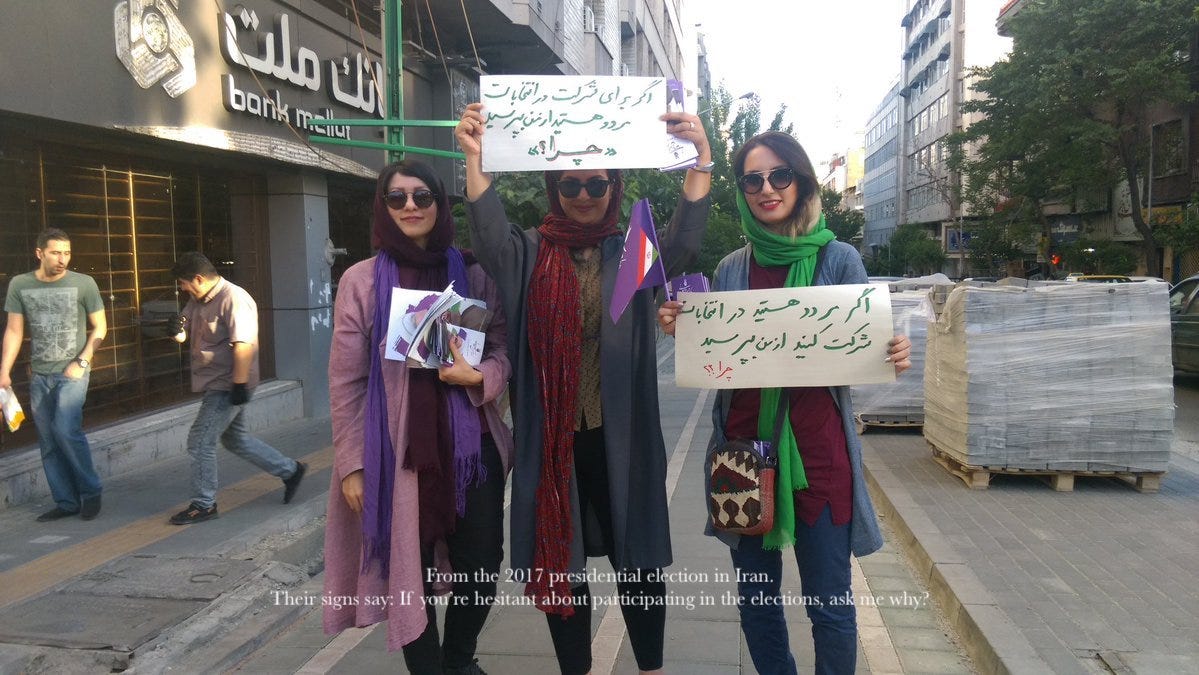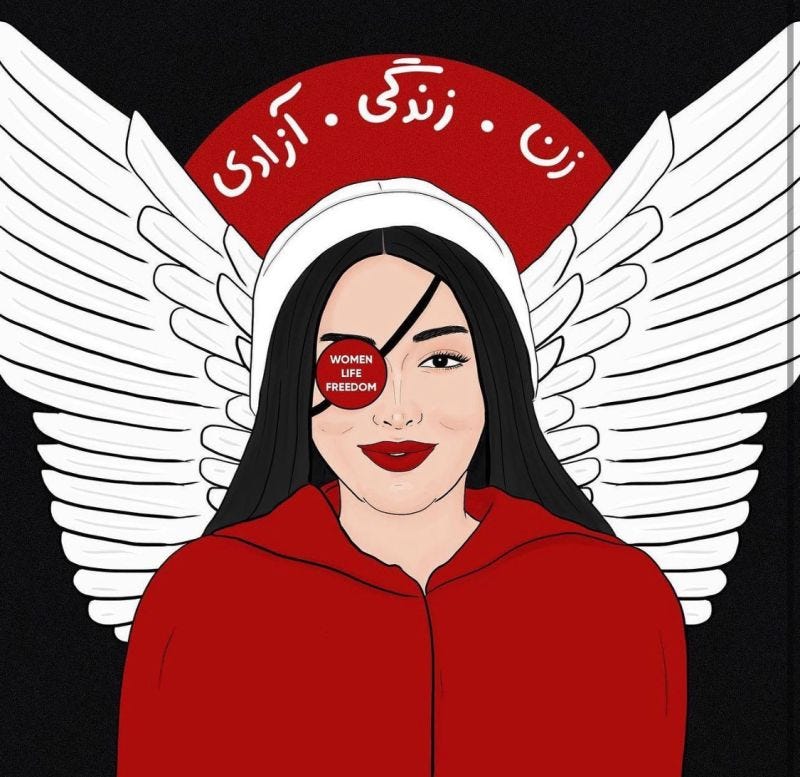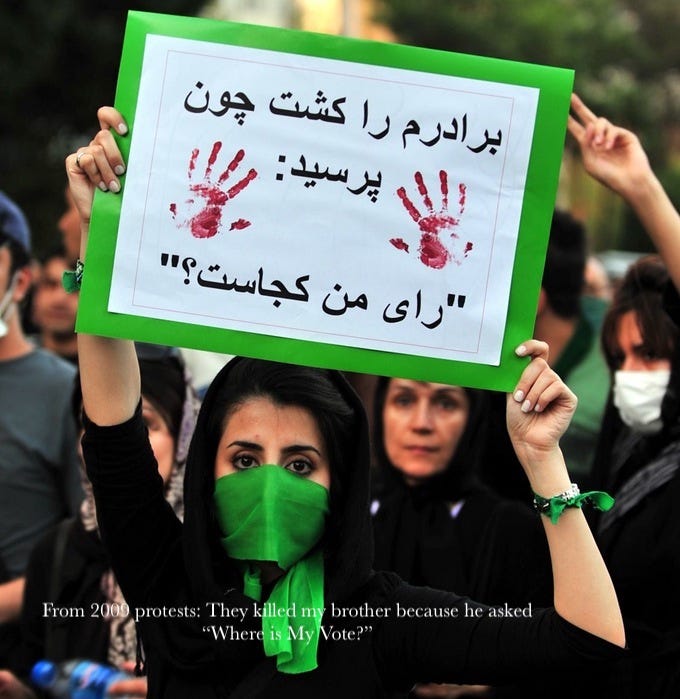To Vote or Not to Vote: A View from Iran
To vote or not to vote. That is the question these days in two seemingly opposite countries: the United States and Iran. It’s a well-known fact that voter turnout in the United States is typically lower than that of many other countries. While electoral participation in the 2020 elections jumped to 62.8%, it normally hovers just above 50% of total eligible voters. Wealthier and older people tend to vote more than the lower income and youth. Younger people tend to tune out or believe their vote—their entire well-being perhaps—doesn’t matter to the system. Some believe that the kind of change they seek cannot happen through electoral politics. While withholding one’s vote is rarely an articulated political stance in the US, as November approaches some who strongly oppose the Biden administration’s involvement and support for Israel’s war on Gaza are arguing for not voting as an ethical stance (or as demonstrated in the Michigan primaries, voting “uncommitted.”) It’s impossible to tell how this will affect Biden’s chances of beating Trump in crucial swing states but one thing is for certain: To vote or not to vote will be a question that the anti-war segment of the electorate will be seriously debating.
In the Islamic Republic of Iran, the question of electoral participation is a deliberately political one even though by no means are elections free and fair. While anyone can put forth their name to be considered (including women who are in effect—and some would argue constitutionally—banned from becoming president), candidates are vetted by an unelected 12-person body called the Guardian Council. Despite this, it’s remarkable that the population, and sometimes the system itself, uses these elections to carve out a space to express itself and to lift up its voice, even if for an ephemeral moment. At times, this has meant a real competition of ideas amongst the candidates along with sustained efforts to get out the vote. But increasingly, as the spectrum of permissible ideas and personalities have shrunk, the focus has been on one question: Should we vote, hoping for change, or should we withhold our vote to protest a system that so cruelly suppresses almost all types of opposition.
On Friday June 28th, 2024, Iran will hold its first presidential election since the Women, Life, Freedom protests and their subsequent bloody suppression in 2022. The election was called a year early due to the death of Ebrahim Raisi, Iran’s president who died in a helicopter crash in May of this year. He was elected in 2021 with one of the lowest turnouts in the Islamic Republic’s history: 48.5%. The percentage of invalid or blank votes in this election were higher than the vote shares of each of the three other candidates who lost.
With less than a week to go, the debates in Iran have once again turned to the question of voting or not.1 But the tenor, as my guest writer, FG, explains below, is imbued with something more than just electoral boycott. It is electoral qahr. Qahr is a wholly untranslatable word in Persian. It means to stop talking to someone but it also contains “a cluster of negative emotions such as hate, anger, dislike, and hurt,” and sometimes even guilt and shame. People can qahr with each other for a week or for decades. To reconcile is to ashti, itself another complicated ritual that always involves a mediator.2 Iran’s population, notes FG, is now in a collective qahr with the Iranian state.
So what to do? This is a question that FG (name withheld for her safety), a middle aged professional, writer, and mother of two who has always lived in Iran, mulls over in the piece below, which she wrote in Persian, and I translated and annotated. (She also wrote one of the most insightful analyses of generational difference during the Women, Life, Freedom protests, which you can read here.) Contrary to the chorus of Iran analysts in the US who remain committed to re/producing the argument that elections don’t matter (because, they claim, the only thing that matters is fundamental change and elections don’t lead to those) and who have nothing at stake in being wrong (you don’t lose your job just because you’re consistently wrong when writing about Iran), FG and millions of other Iranians have their present and their future at stake.3 And thus, their deliberations on what matters and the meaning of their active qahr or their ephemeral ashti, is one that deserves to be heard and carefully considered.
Naghmeh,
When I first read a news clip about the president’s helicopter crashing, I knew for a fact that he hadn’t survived even though the report gave assurances that he had. There was something in the words that was telling me he was dead without actually saying it. It didn’t take more than a few hours before the truth came out. He was, indeed, dead.
The first thing that went through me was a kind of anxiety and whispered foreboding. What’s going to happen in the next elections? So I began to ask friends and acquaintances a by now familiar question: Do we vote or do we not vote?
For many people in Iran today, my question is annoying if not downright ridiculous. Since 2009 [the Green movement], there’s been lines of blood drawn between people and the government. In the last struggle between the two, during the Women, Life, Freedom movement, young people and even children were killed with great cruelty. The government’s response was imbued with a strange kind of fury and almost grudge against the protestors. Some people were blinded, some were beaten up and taken to prison, some were sentenced to death and then executed. Something like this had also happened in 2009, 2017/2018, and 2019.
There was no space left for protest and so people’s response became just one thing: To withdraw from civic interactions, to not vote, to ignore invitations and campaigns to take part in governmental activities. It was a collective qahr in the face of a power that makes you feel like you’re nothing.
But it wasn’t clear: Did we, ourselves, qahr with the state or had we just been set aside by it? The apex of this qahr was the recent parliamentary elections [on May 10, 2024, just 9 days before Raisi’s death] when in the second round, only 7% of the electorate voted in Tehran.4 At the time I kept thinking that in the absence of people’s voices, only one voice remains and that is the loud voice of power. Voting was the only right people have in this system to safely speak without paying a hefty price. What threat could their qahr possibly pose to the system? Apparently none.
In Iran people began to meaningfully take part in elections starting in 1997 when they deliberately used their votes to put candidates in power that they knew the state considered undesirable. This became increasingly unpalatable to the powers that be, and slowly you felt that even though people’s participation had always been used as evidence for the legitimacy of the system, it was becoming a nuisance to their internal power sharing, something they had been doing with ease for many years.
And so a complicated situation was born: The state both wanted the people’s votes and didn’t. The same went for the people who both wanted to speak to the state through voting but also didn’t want to add legitimacy to it through high electoral participation. Eventually though, things came to a head and people just withdrew.
On the one hand the opposition, whom no one really knows if they get cues from the establishment or not, conveyed to the people that your vote is a confirmation of the entire system and on the other hand, the state eroded and destroyed any desire people may have had to vote by limiting the list of candidates who could stand in elections and debilitating the ability of those who were chosen by the people to carry out their promises. In the end, hopeless about their ability to have a say in their governance the people entered into their qahr, a heavy and grumpy kind of qahr that persists even in this unexpected opportunity created by the death of the president.
In previous years the state tried to homogenize power by filtering out unwanted candidates. But this year, the presence of a moderate candidate that people never imagined could pass through the government filters [i.e. the Guardian Council] has created a doubt in our minds.5 Is it that in the aftermath of low participation in recent elections, the government has a legitimacy problem? Is this candidate merely a trick to increase participation? If people actually vote, would his name come out of the ballot box? Is there a chance of vote rigging? And even if he actually gets elected, is there a chance that he could be allowed to improve the current situation? Or is he talking of democracy and freedom during his campaign to fool us? And even if he’s sincere, would he be allowed to implement any of these ideas?6 Are the other extremist candidates who are competing against him there to direct us towards him and increase participation? Or are they just there with their scary faces and scary ideas to further isolate Iran? If we don’t vote and let the ever-present minority of voters determine the next president, have we not even further limited ourselves with our inopportune apathy? I constantly ask myself these questions.
When with fear (and a little bit of embarrassment) I ask others: Will you vote? I almost always get a no. Many times, I’ve been accused of ignorance, naivete, stupidity, and treason towards Iran and the youth who have been killed. Nonetheless, I keep asking everyone because I feel if voting is the only way that we can create change without paying a hefty price, even if this change is only a little, what do we gain from our collective qahr? If through the simplest form of civic engagement, which apparently we still have, we can improve our situation just a tiny bit, what’s the problem there? Will our withholding the vote truly lead to the system’s illegitimacy? Will this message of illegitimacy really lead to a change in the system’s behavior or a structural change in governance? Or will it only lead to a decision by those in power to forgo elections once and for all and create a system where they no longer need our votes, even for show?
These and a hundred other questions run through my mind day and night as I amble through all kinds of media. At night, I look at pictures of those kids drowning in bullets and blood, and I think to myself no! My vote would be a betrayal. Then in the morning I tell myself, if with my vote I could stop these killings, even for a short time, why wouldn’t I do it?
I don’t know…I’ve become adrift. Iran is a complicated place. Or maybe it’s just me who thinks it is.
In 2017, my colleague Arang Keshavarzian and I analyzed the debates around turnout in Iranian elections along with several other lessons we all could, but won’t, learn from the decades-long practice of elections in the Islamic Republic of Iran: https://merip.org/2017/05/lessons-learned-and-ignored/
For more on qahr/ashti, check out the late Kavous Behzadi’s excellent research : https://pubmed.ncbi.nlm.nih.gov/7956304/
There are too many examples to cite. Just google “Iran elections don’t matter” for examples of this genre of writing from various election cycles.
Many individuals such as Nobel Prize winner Narges Mohammadi and various
groups boycotted these elections.
To learn more about the six candidates vying for the presidency see: https://www.atlanticcouncil.org/blogs/iransource/iran-presidential-election-profiles-jalili-ghalibaf-pezeshkian/
There is a remarkable video of a meeting between the reformist candidate Masoud Pezeshkian and a number of young people where the candidate is interrogated and questioned repeatedly about his campaign promises, both what he wants to do and what he can do. While the video is meant to convince Gen-Zers to support Pezeshkian, everytime he tries to explain politics to them (often peppered with English phrases) you can just see a thought bubble forming over their heads that says: Ok boomer!




